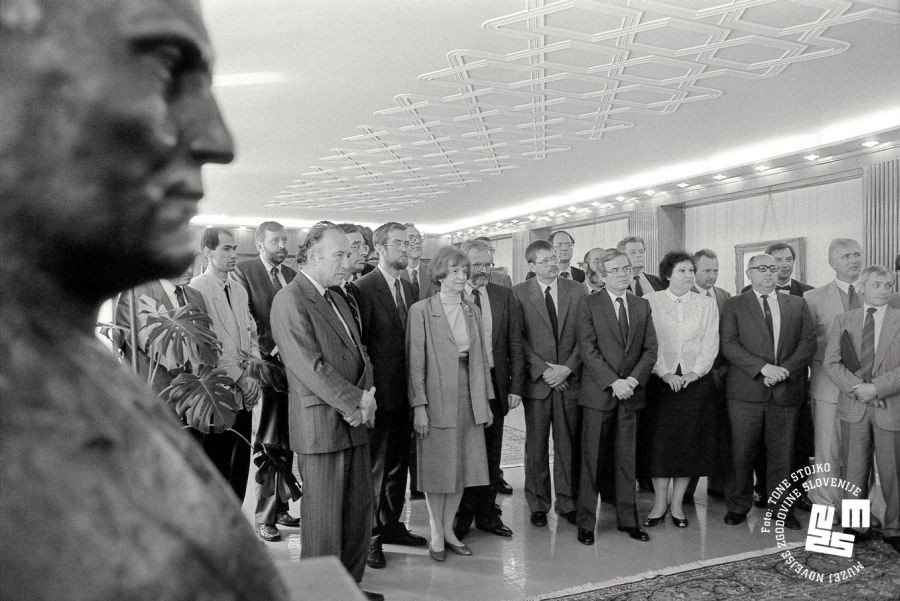28. 2. 1991: Prepared defence and protection act proposal to ensure a plebiscite decision
The draft defence and protection act was submitted to the Assembly in the autumn of 1990. The discussion was postponed mainly by the Chamber of Associated Labour, which, however, finally approved the draft in early 1991. The government immediately drafted an act proposal, and this time the Assembly submitted the document for parliamentary consideration by the fast-track procedure. The deputies were informed of the Croatian resolution on secession from the SFRY, which was included on the agenda of the Assembly's session in early March. With the defeat of the Iraqi army, the war against Iraq ended and Saddam Hussein agreed to all 12 resolutions of the United Nations Security Council.
Puhar and Stanič on their own and the government's decisions, Rupel and Mencinger in foreign media
Minister of Labour Jožica Puhar from the Democratic Reform Party presented the pension suspension act proposal approved by the government until wages in the country increased by an average of 11% compared to December 1990.
Stane Stanič, Minister of Information, wrote a letter to the correspondent of the Serbian daily Politika ekspres, Aleksandra Plavevski. He was critical of her writing about Prime Minister Peterle as a clericalist who was allegedly not immune to corruption and received a commission of six million German marks for buying weapons. He described the writing as irresponsible and false, so he advised her not to attend press conferences. Andrej Poznič protested against the letter on behalf of the Slovene Association of Journalists (DNS). It is interesting that on a completely different occasion, the commemoration of the 600th anniversary of the Battle of Kosovo in Gazimestan in June the year before, the President of the Slovenian Presidency Janez Stanovnik apologised to Plavevski for her reporting being a target of criticism. In her reporting from Slovenia, the Politika ekspres correspondent was always very negative about Slovenia's aspirations for independence.
On a separate occasion, Stanič announced the decision not to sign the proposal of the federal government agreement, which was supposed to stop the "propaganda war of the Yugoslav mass media". Darko Marin, the Federal Minister of Information, threatened Stanič by telephone that the Slovenian ministry would be accused of undermining the federal government’s good intentions.
Dr Dimitrij Rupel paid a two-day visit to Greece, where he met with representatives of the Foreign Ministry and the Athens Chamber of Commerce and Industry in Athens. He announced for the Athens 1 television channel that the government would follow the events in the SFRY and decide at the end of May when and how it would carry out independence. Deputy Prime Minister Dr Jože Mencinger told the Vienna weekly Wochenpresse that Slovenia may become independent much earlier than 23 June. He also stated that Slovenia is aiming for demilitarisation or a kind of Costa Rica in Europe, i.e. a country without an army.
Turbulent developments in the sphere of education
The rector of the University of Maribor, Dr Alojz Križman, resigned. In an open letter to the Minister of Education Dr Petar Vencelj he cited overwork and fatigue as reasons for his resignation. He also wrote that "serfdom had always had a bad effect on the morale of the Slovenian nation" and that the rector's position should be occupied by a person who "would be able to listen to a voluntary accident". With these words, he was critical of the reduction in funds for education in the budget proposal and at the same time the increase in funds for the military, police and international activities.
Anton Stres presented a view on religious instruction in schools in a leading opinion article in Delo newspaper. He advocated similar solutions to those used in some other European countries.
Author: Jani Drnovšek
Similar articles
-
Triumphant Year of 1991
-
9. 5. 1991: Facilitated processing of independence laws
-
2. 3. 1991: Slovenians abroad and around the world in concern for Slovenia
-
1. 3. 1991: Franco Juri against the transfer of conscripts to the Slovenian Territorial Defence
-
28. 2. 1991: Prepared defence and protection act proposal to ensure a plebiscite decision
-
27. 2. 1991: The persistently looming red star
-
26. 2. 1991: A hopeless search for the Yugoslav modus vivendi
-
16. 2. 1991: Ciril Ribičič on the red star and reservations about the dissolution of Yugoslavia
-
15. 2. 1991: Two thirds of respondents have faith in an independent Slovenia
-
27. 1. 1991: Between a relaxation of tensions at home and a deteriorating situation in the Middle East



